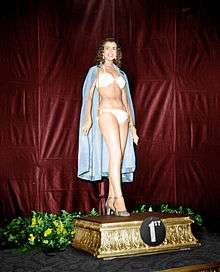Miss World
|
Logo of the Miss World Pageant | |
| Motto | Beauty with a Purpose |
|---|---|
| Formation | 1951 |
| Type | Beauty pageant |
| Headquarters | London |
| Location | |
Official language | English |
President | Julia Morley |
Key people | Eric Morley |
| Website |
missworld |
The Miss World pageant is the oldest surviving major international beauty pageant. It was created in the United Kingdom by Eric Morley in 1951.[1][2] Since his death in 2000, Morley's widow, Julia Morley, has co-chaired the pageant.[3][4] Alongside with its rival, the Miss Universe and Miss Earth contests, Miss World pageant is one of the three most publicised beauty contests in the world.[5][6][7][8]
The current Miss World is Mireia Lalaguna of Spain who was crowned on 19 December 2015 in Sanya, China PR.
20th century

In 1951, Eric Morley organised a bikini contest as part of the Festival of Britain celebrations which he called the Festival Bikini Contest.[9] The event was popular with the press, and was dubbed "Miss World" by the media. The swimsuit competition was intended as a promotion for the bikini[10] which had only recently been introduced onto the market, and which was still widely regarded as immodest. When the 1951 Miss World pageant winner, Kerstin "Kiki" Hakansson from Sweden, was crowned in a bikini, it added to the controversy.
The pageant was originally planned as a Pageant for the Festival of Britain, but Eric Morley decided to make the Miss World pageant an annual event.[11][12] Morley registered the "Miss World" name as a trademark,[13] and all future pageants were held under that name. However, because of the controversy arising from Håkansson's crowning in a bikini, countries with religious traditions threatened not to send delegates to future events, and the bikini was condemned by the Pope.[14] Objection to the bikini led to its replacement in all future pageants[15][16] with what was accepted as more modest swimwear, and from 1976 swimsuits were replaced by evening gowns for the crowning.[17] Håkansson remains the only Miss World crowned in a bikini.[13] In Miss World 2013 all participants wore a one-piece swimsuit plus a traditional sarong below the waist as a compromise with local culture.[18]
In 1959, the BBC started broadcasting the pageant. The pageant's popularity grew with the advent of television. During the 1960s and 1970s, Miss World would be among the most watched programs of the year on British television.[19] However, in 1970, the Miss World contest in London was disrupted by women's liberation protesters armed with flour bombs, stink bombs, and water pistols.[20]
In the 1980s, the pageant repositioned itself with the slogan Beauty With a Purpose, with added tests of intelligence and personality.[21] However, there have been various objections to the contest.[22][23] Although it still "enjoys success worldwide, it was last broadcast on UK televisions in 1998."[24]
21st century
Eric Morley died in 2000, and his wife, Julia, succeeded as chairwoman of the Miss World organisation.[25]
The first black African Miss World winner, Agbani Darego of Nigeria, was crowned in 2001. As part of its marketing strategy, Miss World came up with a "Vote For Me" television special during that edition, featuring the delegates behind the scenes and on the beach, and allowing viewers to either phone in or vote online for their favourites. It also sells its Talent, Beach Beauty and Sports events as television specials to broadcasters.[26]
In 2002 the pageant was slated for Abuja, the capital city of Nigeria to host its final. This choice was controversial, as a northern Nigerian woman, Amina Lawal, was awaiting death by stoning for adultery under Sharia law there, but Miss World chose to use the publicity surrounding its presence to bring greater global awareness and action to Amina's plight (see Controversies section).[27][28]
In 2014, the organisation eliminated the swimsuit competition from the pageant.[29]
Miss World organisation

The Miss World Organisation owns and manages the annual Miss World Finals, a competition that has grown into one of the world's biggest.[30] Since its launch in 1951, the Miss World organisation has raised more than £250 million for children's charities[31] that help disabled and underprivileged children.[32] Miss World is franchised in more than 100 countries.[33][34] Miss World, Limited is a privately held firm, and thus figures for its earnings, expenses and charitable contributions are not publicly available.
Titleholders
| Year | Country/Territory | Miss World | National Title | Location | Number of Entrants |
| 2015 | |
Mireia Lalaguna | Miss Spain | Sanya, China PR | 114 |
| 2014 | |
Rolene Strauss | Miss South Africa | London, United Kingdom | 121 |
| 2013 | |
Megan Young | Miss World Philippines | Bali, Indonesia | 127 |
| 2012 | |
Yu Wenxia | Miss China World | Ordos, China PR | 116 |
Winners gallery
-

Miss World 2013
Megan Young, Philippines -

Miss World 2011
Ivian Sarcos, Venezuela -

Miss World 2009
Kaiane Aldorino, Gibraltar -

Miss World 2008
Ksenia Sukhinova, Russia -

Miss World 2007
Zhang Zilin, China PR -

Miss World 2006
Taťána Kuchařová, Czech Republic -

Miss World 2004
María Julia Mantilla, Peru -

Miss World 2003
Rosanna Davison, Ireland -

Miss World 2000
Priyanka Chopra, India -

Miss World 1999
Yukta Mookhey, India -

Miss World 1998
Linor Abargil, Israel -
.jpg)
Miss World 1997
Diana Hayden, India -

Miss World 1994
Aishwarya Rai, India -

Miss World 1978
Silvana Suárez, Argentina -

Miss World 1977
Mary Stävin, Sweden -

Miss World 1967
Madeline Hartog-Bel, Peru -

Miss World 1964
Ann Sidney, United Kingdom -

Miss World 1963
Carole Joan Crawford, Jamaica -
.jpg)
Miss World 1962
Catharina Lodders, Netherlands -

Miss World 1961
Rosemarie Frankland, United Kingdom -
.jpg)
Miss World 1959
Corine Rottschäfer, Netherlands -

Miss World 1958
Penelope Coelen, South Africa -

Miss World 1957
Marita Lindahl, Finland -

Miss World 1956
Petra Schürmann, Germany -

Miss World 1954
Antigone Costanda, Egypt -

Miss World 1951
Kiki Håkansson, Sweden
Pageant controversies
The Miss World pageant has been the target of many controversies since its inception.
- In 1970, feminist protesters threw flour bombs during the live event at London's Royal Albert Hall, momentarily alarming the host, Bob Hope.[35][36]
- The 1973 winner, Marjorie Wallace, was stripped of her title on 8 March 1974, because she had failed to fulfill the basic requirements of the job. The Miss World organizers did not elect someone to serve in her place.[37]
- In 1976, several countries went on a boycott, because the pageant included both a Caucasian and African representative for South Africa.[38] South Africa competed for the last time in 1977, before it was welcomed back in 1991 as Apartheid disintegrated.[39]
- The 1980 winner Gabriella Brum of Germany resigned one day after winning, initially claiming her boyfriend disapproved. A few days later it emerged that she had been forced to resign after it was discovered that she posed naked for a magazine.[40]
- In 1996, wide-scale protests took place in Bangalore, India, over the hosting of the beauty contest. The swimsuit shootings were moved to the Seychelles, and heavy security was placed. Despite the chaos, the pageant's live telecast went on smoothly.[41][42][43]
Nigeria 2002
In the year leading up the finals in Nigeria, several European title holders lobbied their governments and the EU parliament to support Amina Lawal's cause.[44][45] A number of contestants followed the lead of Kathrine Sørland of Norway in boycotting the contest (despite the controversy Sørland would go on to become a semi-finalist in both the Miss World and Miss Universe contest), while others such as Costa Rica were instructed by their national governments and parliaments not to attend the contest. Among the other boycotting nations were Denmark, Spain, Switzerland, Panama, Belgium and Kenya. There was further controversy over the possibly suspended participation of France and South Africa, which may or may not have been due to the boycott.[46] For her part, Lawal asked that contestants not suspend their participation in the contest, saying that it was for the good of her country and that they could, as the representative of Sweden had earlier remarked, make a much stronger case for her on the ground in Nigeria.[47]
Despite the increasing international profile the boycott was garnering in the world press, the contest went ahead in Nigeria after being rescheduled to avoid taking place during Ramadan, with many prominent nations sending delegates. Osmel Sousa of Venezuela, one of the world's most influential national directors, famously said "there is no question about it (the participation of Miss Venezuela in the contest)." The trouble did not end there, however. A ThisDay (Lagos, Nigeria) newspaper editorial suggesting that Muhammad would probably have chosen one of his wives from among the contestants had he been alive to see it, resulted in inter-religious riots that started on 22 November in which over 200 people were killed in the city of Kaduna, along with many houses of worship being burned by religious zealots.[48] Because of these riots, the 2002 pageant was moved to London, following widely circulated reports that the representatives of Canada and Korea had withdrawn from the contest and returned to their respective countries out of safety concerns. A fatwa urging the beheading of the woman who wrote the offending words, Isioma Daniel, was issued in Nigeria, but was declared null and void by the relevant Saudi Arabian authorities.[49][50][51][52] Upon the pageant's return to England, many of the boycotting contestants chose to attend, including Miss Norway, Kathrine Sørland, who was ironically tipped in the last few days as the number one favourite for the crown she had previously boycotted.[53][54][55][56][57]
The eventual winner of the pageant was Azra Akın of Turkey, the first predominantly Muslim country to hold the title since Egypt in 1954.[58]
References
- ↑ Michael Smith. "Miss World Competition Says No to Bikini Yes to Sarong". Guardian Liberty Voice. Retrieved 26 January 2016.
- ↑ "Miss Universe on August 23". Timesofmalta.com. Retrieved 24 May 2011.
- ↑ Paul Lewis (11 November 2000). "Eric Morley, 82, Miss World Promoter, Dies". nytimes.com (The New York Times). Retrieved 11 October 2013.
- ↑ "Pageant News Bureau – Miss World: A long, glittering history". Pageant.com. Retrieved 24 May 2011.
- ↑ "Tianjin Miss World China Pageant comes to a close". China Daily. 28 August 2009. Retrieved 24 May 2011.
- ↑ "Brazil's Miss World finalist has her hands and feet amputated". English.pravda.ru. 22 January 2009. Retrieved 24 May 2011.
- ↑ Sylvia Toh Paik Choo (24 June 2008). "MISS Singapore Universe". Archived from the original on 28 June 2008. Retrieved 11 October 2013.
- ↑ "Tracing the regal existence of 'Miss Universe'". Spicezee.com. 7 October 2008. Retrieved 24 May 2011.
- ↑ Stein, Elissa; Meriwether, Lee (2006). Beauty Queen. Chronicle Books. p. 45. ISBN 0-8118-4864-7.
- ↑ Dewey, Susan (2008). Making Miss India Miss World. Syracuse University Press. p. 46. ISBN 0-8156-3176-6.
- ↑ "Frontline World: A Pageant is Born". Pbs.org. Retrieved 24 May 2011.
- ↑ "Bet on Miss World Pageant". Covers.com. Retrieved 24 May 2011.
- 1 2 Lovegrove, Keith (2002). Pageant: The Beauty Contest. teNeues. p. 1967. ISBN 3-8238-5569-7.
- ↑ "Selvedge: The Fabric of Your Life". Selvedge Ltd. 2005: 39.
- ↑ Marcus, Ben; Divine, Jeff (2005). Surfing USA!: An Illustrated History of the Coolest Sport of All Time. MVP Books. p. 60. ISBN 978-0-89658-690-1.
- ↑ Magnanti, Brooke (7 June 2013). "Miss World bikini ban: why it's no victory for feminists". Telegraph. Retrieved 22 August 2013.
- ↑ Shin, Han (2004). Beauty with a Purpose. iUniverse. p. 193. ISBN 0-595-30926-7.
- ↑ "Bikini ban at Miss World pageant". Retrieved 8 June 2013.
- ↑ "Miss World gets a makeover". news.bbc.co.uk (BBC News). 9 September 1998. Retrieved 9 October 2013.
- ↑ "BBC Radio 4 – Woman's Hour – Women's History Timeline: 1960 – 1969". Bbc.co.uk. Retrieved 8 March 2014.
- ↑ "Tiza.com. Miss World". Tiza.com. Retrieved 24 May 2011.
- ↑ "Should the Miss World pageant have gone ahead?". BBC News. 9 December 2002. Retrieved 24 May 2011.
- ↑ "Mayor's frosty reception for Miss World". BBC News. 26 November 2002. Retrieved 24 May 2011.
- ↑ Brooke Magnanti. Miss World bikini ban: why it's no victory for feminists. Telegraph Media Group 07 Jun 2013
- ↑ Miss World contest history Archived 8 March 2014 at the Wayback Machine
- ↑ "Miss World facts". Worldcountrylink.com. Retrieved 24 May 2011.
- ↑ "Miss World Riots in Nigeria". Democracynow.org. Retrieved 24 May 2011.
- ↑ "Nigerian woman fights stoning". BBC News. 8 July 2002. Retrieved 24 May 2011.
- ↑ Lange, Maggie (18 December 2014). "Miss World Pageant Axes Swimsuit Portion". New York Magazine. Retrieved 22 December 2014.
- ↑ "ElEconomista.es. Miss World Organisation and Mauj Telecom Ink Global Deal on Mobile Content and Applications". El Economista. 6 June 2006. Retrieved 24 May 2011.
- ↑ Philanthropy World. Beauty with a Purpose
- ↑ "Miss Trinidad and Tobago is new Miss World". Boca Raton News. November 14, 1986. Retrieved 26 January 2016.
- ↑ "Newly crowned Miss Namibia 2009, Happie Ntelamo". The Economist .na. 19 June 2009. Retrieved 24 May 2011.
- ↑ "Warsaw-life.com. Miss World comes to Warsaw". Warsaw-life.com. Retrieved 24 May 2011.
- ↑ "Miss World 2006". Retrieved 26 January 2016.
- ↑ "Last milestone on a record-breaking comedy Road ... Bob Hope dies at 100". Buzzle.com. 29 July 2003. Retrieved 24 May 2011.
- ↑ Miss World is stripped of her title
- ↑ "Miss World 1976". Pageantopolis. Retrieved 24 May 2011.
- ↑ "Miss World 1977". Pageantopolis. Retrieved 24 May 2011.
- ↑ "Miss World 1980". Pageantopolis. Retrieved 24 May 2011.
- ↑ CNN – Miss Greece now Miss World, despite pageant protests
- ↑ "Indian police prepare for worst in beauty pageant clash". CNN. 22 November 1996. Retrieved 24 May 2011.
- ↑ "Beauty pageant in India becomes a contest of wills". CNN. 22 November 1996. Retrieved 24 May 2011.
- ↑ "As Miss World Turns". The Nation. Retrieved 24 May 2011.
- ↑ "CNN – Miss World boycott over Nigerian stoning". CNN. 7 September 2002. Archived from the original on 7 July 2012. Retrieved 24 May 2011.
- ↑ "Miss World 2002". Pageantopolis. Retrieved 24 May 2011.
- ↑ "Woman sentenced to stoning freed". CNN. 26 September 2003. Retrieved 24 May 2011.
- ↑ "Nigeria riots toll 'passes 200'". BBC News. 24 November 2002. Retrieved 24 May 2011.
- ↑ "Miss World 2002 – The World at their Feet". Isioma.net. Retrieved 24 May 2011.
- ↑ Isioma Daniel (17 February 2003). "Nigerian journalist Isioma Daniel tells her story". The Guardian (UK). Retrieved 24 May 2011.
- ↑ "Nigeria's journalist on the run". BBC News. 27 November 2002. Retrieved 24 May 2011.
- ↑ "Miss World and Islam: "Fatwa" and Isioma Daniel a Nigerian "Fatwa"". Nigeria World. 26 November 2002. Retrieved 24 May 2011.
- ↑ "Contestants boycott Miss World". Modern Gent. Retrieved 24 May 2011.
- ↑ "– Don't boycott Nigeria's Miss World contest, begs mother facing stoning". Telegraph.co.uk. 7 December 2013. Retrieved 8 March 2014.
- ↑ "– Contestants threaten Miss World boycott over stoning". Telegraph.co.uk. 7 December 2013. Retrieved 8 March 2014.
- ↑ "Nigeria faces Miss World boycott threat". BBC News. 27 August 2002. Retrieved 24 May 2011.
- ↑ "Miss World Nigeria boycott spreads". BBC News. 6 September 2002. Retrieved 24 May 2011.
- ↑ "Miss World". Pageantopolis. Retrieved 24 May 2011.
External links
| Wikimedia Commons has media related to Miss World. |
| ||||||||||
